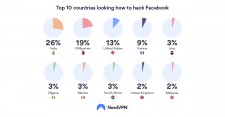Research by NordVPN: Growing Number of Hackers Attempt Breaking Into Facebook Accounts

LONDON, September 10, 2020 (Newswire.com) - The lockdown inspired people to try new hobbies — TikTok was oozing with dog training, cinnamon rolls, and dance challenges in spring. But some internet users opted for more peculiar hobbies.
Google searches related to the keyword “how to hack” went up in April 2020. So experts from NordVPN looked into what exactly people were trying to hack.
Researchers analyzed monthly search terms and found an average of 171,490 worldwide Google searches on how to hack something. 46% of these involved hacking somebody’s Facebook account.
“There is more to that: Facebook is the most popular social login to access third-party sites. That’s why, according to the Dark Web Price Index, Facebook accounts sell for $75. Once obtained by a cybercriminal, Facebook accounts can open the gates to Instagram, online stores that hold credit card data, and more,” says Daniel Markuson, digital privacy expert at NordVPN.
The top three countries where people are the most interested in breaking into somebody else’s Facebook account are India 26%, the Philippines (19%), and the United States (13%).
What else do people want to break into?
When analyzing the volumes of “hack”-related keywords, NordVPN’s researchers found that Wi-Fi comes second on the most desired list. Wi-Fi has always been a target, but the interest increased once people got locked down and had to work or study from their home.
The top three countries where people are looking to take advantage of their neighbour's network include India (23%), Indonesia (13%), and the United States (8%).
The rest of the wanna-hack top-five list includes Gmail (10%), email (2%), and Google account (1%).
How to protect your data
“People may think they are of no interest to hackers, but they are — and the research proves it. Your neighbour may be a hacker trying to break into your Wi-Fi. Your ex-partner may try to get control over your social media accounts. And, of course, a random hacker will grab any chance to sell your account on the dark web,” says Daniel Markuson.
Hackers are good at finding their ways, whether they search for tips on Google or on the dark web. But you can make it harder for them by following simple steps:
- Use unique passwords for different accounts. Once hacked, your credentials can be checked against other services, such as email or online banking. To help you navigate through the sea of passwords, use a password manager like NordPass.
- Use two-factor authentication. Just entering a password won’t be enough — hackers would also have to get access to your phone or email.
- Encrypt all your files with an advanced encryption tool like NordLocker.
- Avoid public Wi-Fi. If you have to use a network you can’t fully trust, use a VPN like NordVPN. A VPN encrypts all communications passing between your device and the internet.
Source: NordVPN